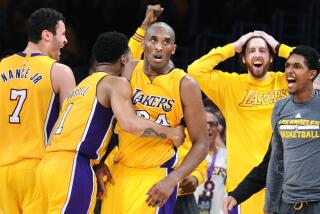SOUTHERN CALIFORNIA ENTERPRISE : Playtime Is Just Beginning : Firm Finds Success--and Fun--in Making Learning Materials
- Share via
Michael and Charles Kaplan sometimes race each other around the Carson headquarters of their company, Lakeshore Learning Materials. In suits. On tot-size tricycles.
“I’m faster,” says Michael, company president and younger brother.
There is a practical aspect to this goofiness: Somebody needs to test new the products Lakeshore will offer through its catalogues and small chain of retail stores specializing in educational toys and school supplies. But it also says a lot about the loose, family-style atmosphere at this company, which was founded by the Kaplans’ mother, Ethelyn, now retired.
The brothers work hard to keep the feeling of a small, friendly firm, even though Lakeshore’s revenue has swollen to $100 million and its work force to more than 500, Michael Kaplan says. And Lakeshore continues to grow and make money despite a downturn in other types of mail-order catalogue businesses, he adds.
The low-key company’s most recent success is its 25% stake in the Store of Knowledge, a glitzy, fast-growing chain associated with KCET-TV and other public television stations that features educational toys and products for all ages.
But the heart of Lakeshore’s business has changed little in more than three decades of catering to the needs of teachers.
“We’ve grown every year for 35 years, and we’ve made money for 35 years,” Kaplan said. “Our niche is institutions. When we get parents, we’re delighted, but we are set up for schools.”
And Lakeshore is a veritable teachers’ amusement park, offering an extensive collection of teaching aids, supplies, equipment, toys, books and the ever-popular laminating machine through three catalogues: one with products for younger grades and infants, one for middle schools and high schools, and one for the general retail market called “Toys to Grow On.” Lakeshore also operates six retail stores.
“I go in there and just say, ‘Wow,’ ” said Debbie Lovell, a West Los Angeles nursery school teacher. “I want all of that stuff.”
There is the basic (construction paper and building blocks), the artistic (finger-paints and clay), the dramatic (face paints and costumes), the scientific (frog hatcheries and egg incubators), the musical (vinyl records and tambourines), the physical (big balls and climbing structures), the practical (nap mats and chalk holders) and the inspirational (“Perfect Attendance” ribbons and “Student of the Week” certificates).
Some products are the result of modern situations, such as the video called “Proms & Pacifiers: Teens as Parents,” which “follows the story of teen-agers Shana and Ronnie as they face the challenges of parenthood.”
Kaplan said his favorite item is the “people-colored” paint, which allows children to paint pictures of people with skin tones other than pinkish-white.
“If you’re a black child and all you get are white dolls and ‘flesh-colored’ paint, it does something to your self-image,” he said.
Several other Lakeshore products promote understanding and accepting diversity, including dolls that are multiethnic, disabled or both.
*
About 40% of Lakeshore’s products are developed by the company’s team of six to eight designers and are manufactured to Lakeshore’s specifications.
Many of the ideas come from teachers, Kaplan said. The company sponsors a contest every year encouraging teachers to submit their ideas for products they have always wanted but could never find. Winners get Lakeshore gift certificates ranging from $250 to $1,000, and their names go in the catalogue with their finished products.
It was 1959 when Ethelyn Kaplan decided to open a toy store on Lakeshore Avenue in Oakland. It was “a resounding non-success,” Michael Kaplan said. But one day, a teacher came in and bought five puzzles.
“She thought, ‘My, there must be a market supplying nursery schools,’ ” Kaplan said.
The toy store was sold and a mail-order business was launched, doing $1,760 in sales the first year.
Ethelyn Kaplan retired in 1975, and her sons, who had been running the firm’s Southern California region, took over and moved the company to Carson.
Lakeshore has continued to grow at a time when many other catalogue companies have not.
The catalogue industry, which enjoyed double-digit sales growth in the 1980s, saw sales increase only 7% or 8% last year. Consultants project that sales growth in the industry has slowed even more this year.
At the same time, sales of learning toys have racked up dramatic increases in the past five years. In one category, electronic learning aids, the value of shipments to retailers jumped to $225 million in 1994 from $132 million in 1989, according to the Toy Manufacturers of America, a New York-based trade group. The value of shipments of building sets increased to $366 million in 1994 from $186 million in 1989.
*
Michael Kaplan credits much of Lakeshore’s success to a creed first established by his mother: Listen to your customers and guarantee your products.
“We listen to teachers. We pay attention to what the customer wants,” Kaplan said. “You’ve got to give them a peak experience.”
Also important, Kaplan said, is the familial culture that Lakeshore has nurtured over the years. The company opened an on-site child-care center three years ago, which also provides many willing product-testers and catalogue models. A profit participation plan distributed more than $1 million of last year’s earnings to employees.
“I’m not giving something away, I’m trying to buy something,” Kaplan said. “We try to align the company’s self-interest with the individual’s self-interest.”
Lakeshore’s challenge has been to grow without too many rules, he said.
“We’ll do about $100 million this year. We have no budgets. We have no secretaries, and we invented the written memo only about three years ago,” he said.
One of Lakeshore’s most recent successes has been its role in the Store of Knowledge chain, which operates out of the second floor of Lakeshore’s Carson headquarters. Kaplan is chief executive of both chains, and Lakeshore owns a minority interest along with Riordan, Lewis & Haden, a Los Angeles venture capital firm that once counted Los Angeles Mayor Richard Riordan as a partner. KCET-TV is a partner, with four Los Angeles stores, and other public television stations participate in the seven stores in other cities.
“Lakeshore is a great company,” said Chris Lewis, a principal in Riordan, Lewis & Haden. “Michael, Charlie and all of their employees deserve a lot of credit because they have built a unique company that a lot of people admire.”
Store of Knowledge, which opened its first store in 1994 in Glendale, is expecting to be running nearly 30 stores by the end of next year.
The curriculum for Lakeshore is less clear--on purpose, Kaplan said.
“People often ask me, ‘Where are you going to be in five years?’ and I say, ‘I don’t have a clue,’ ” Kaplan said. “We’re not so much interested in long-term planning as putting seeds in the ground. I figure if you’re always putting seeds in the ground, things will keep coming up.”
More to Read
Inside the business of entertainment
The Wide Shot brings you news, analysis and insights on everything from streaming wars to production — and what it all means for the future.
You may occasionally receive promotional content from the Los Angeles Times.










